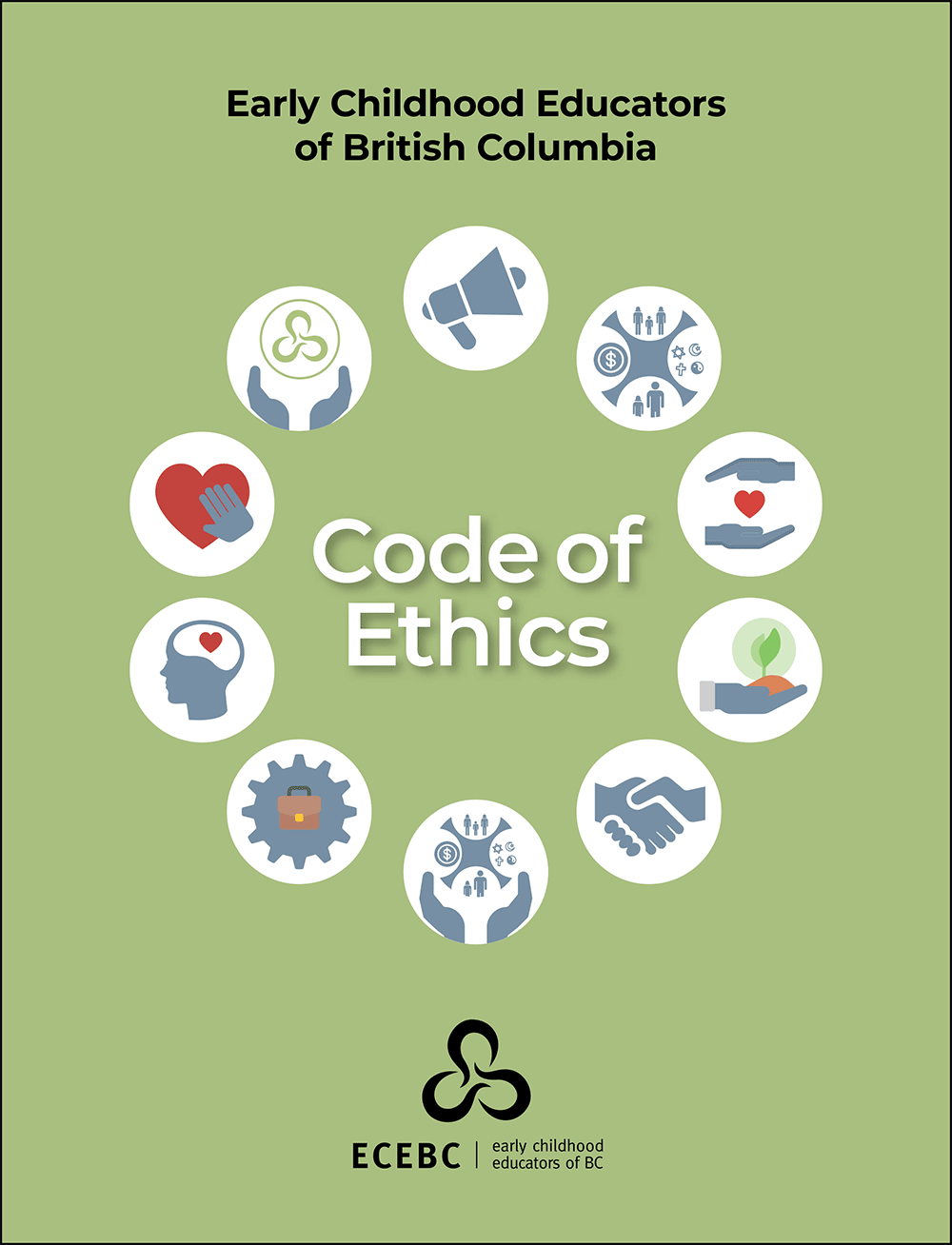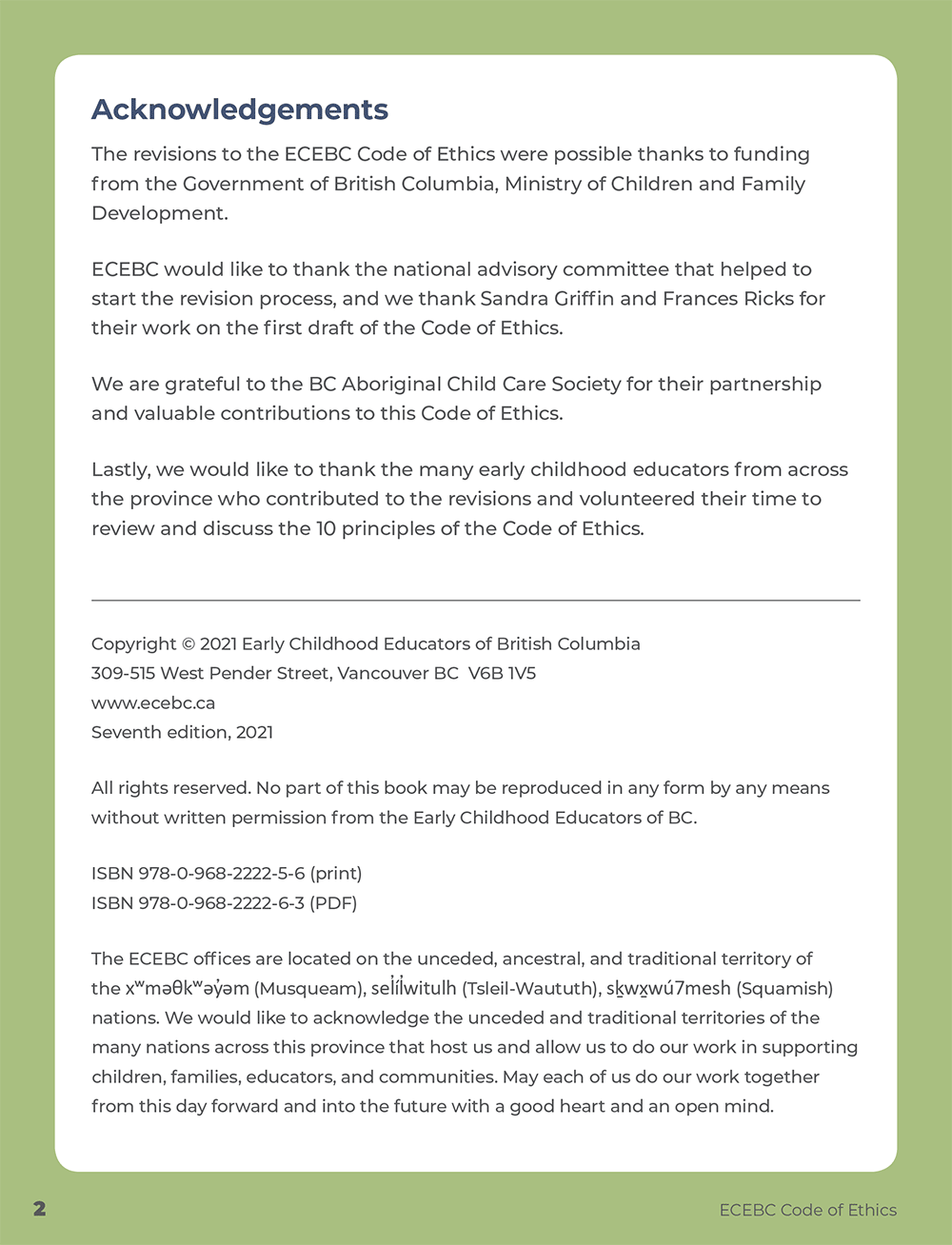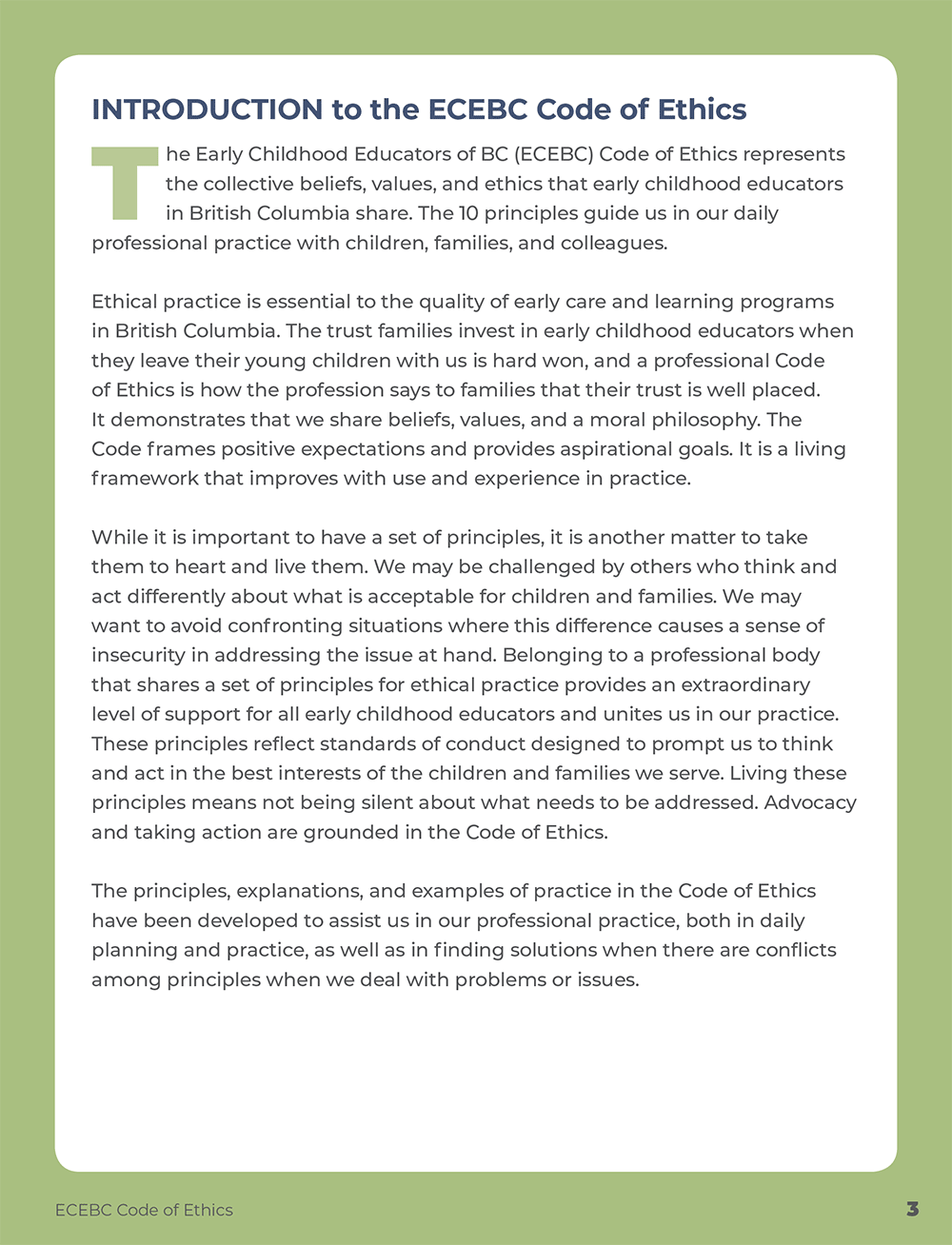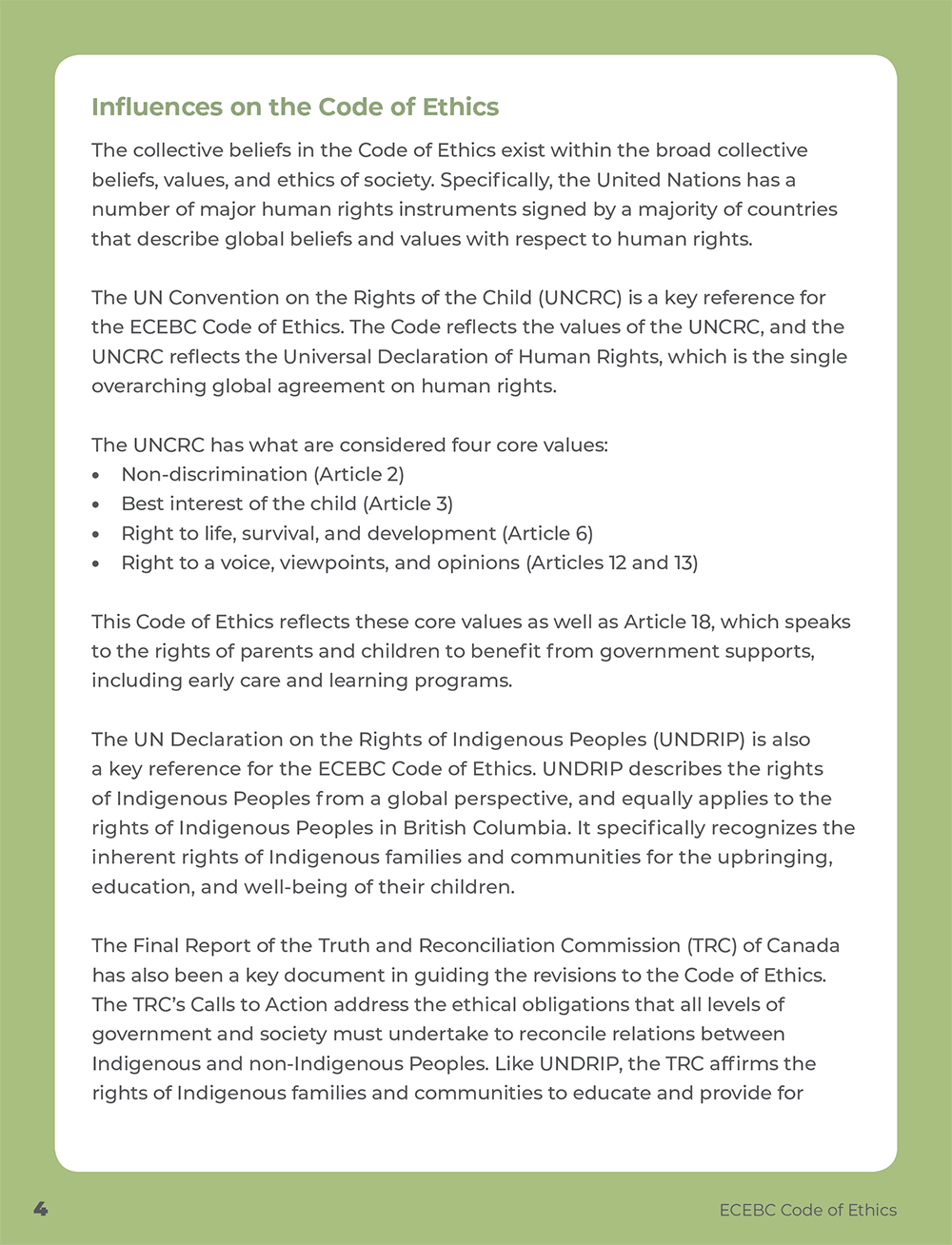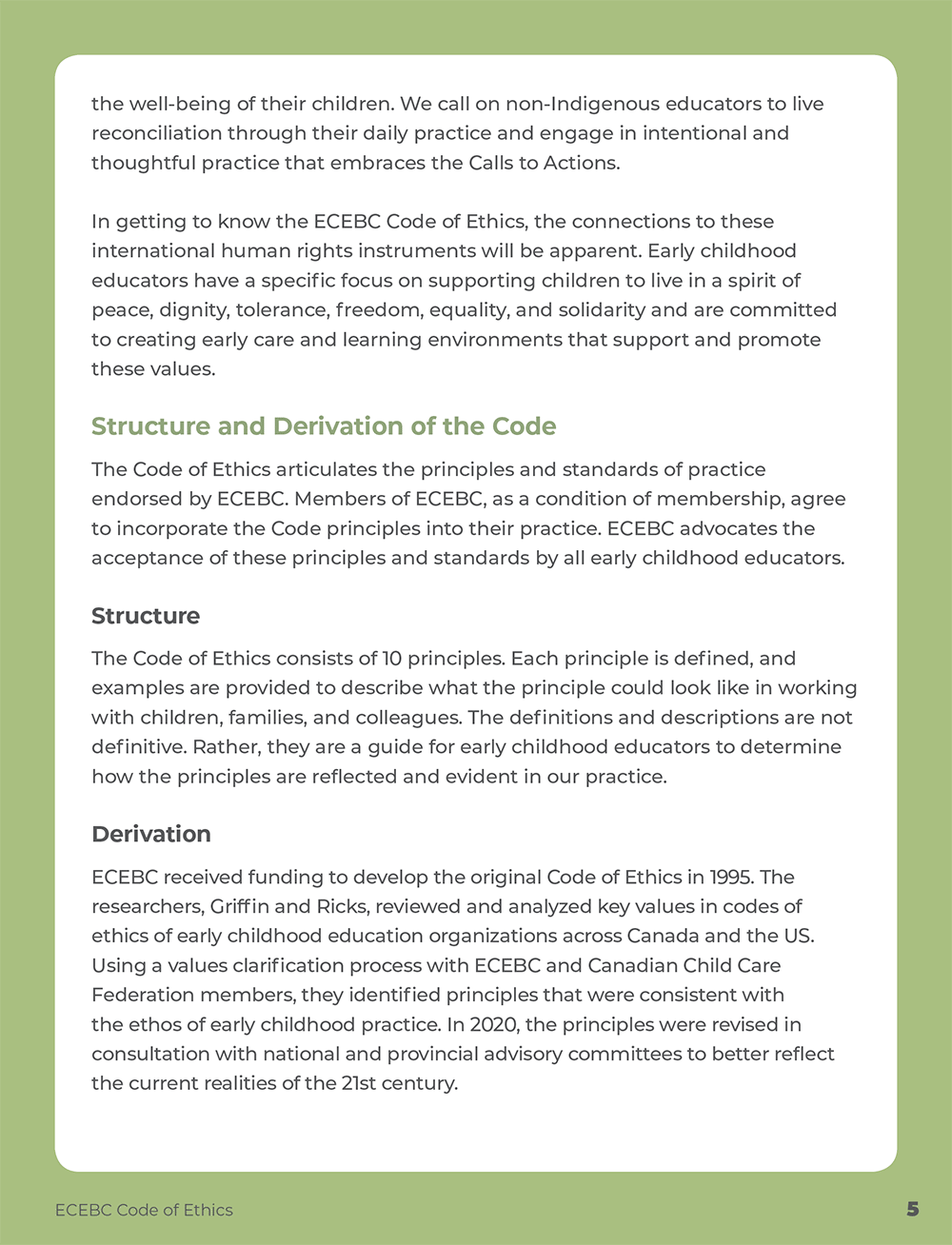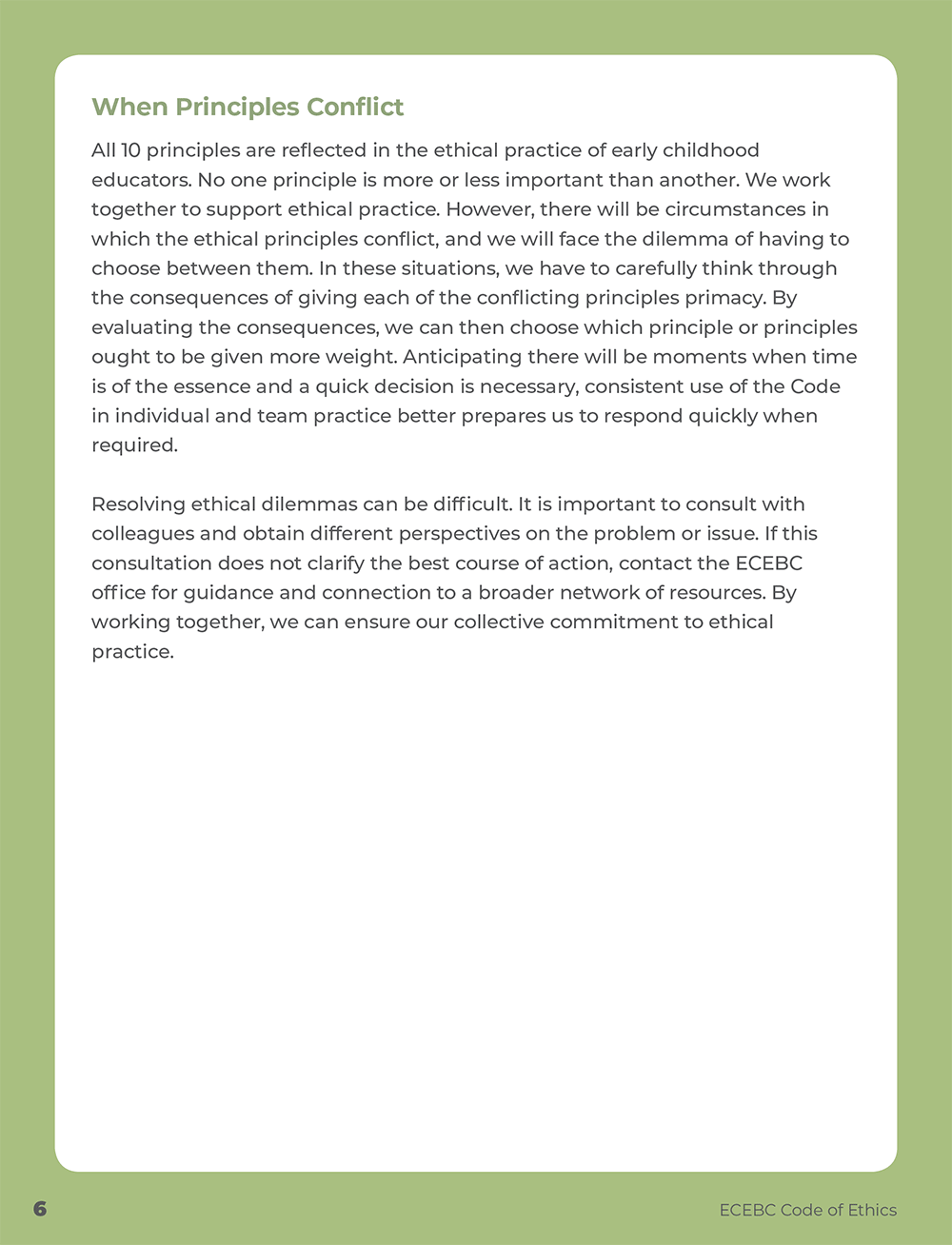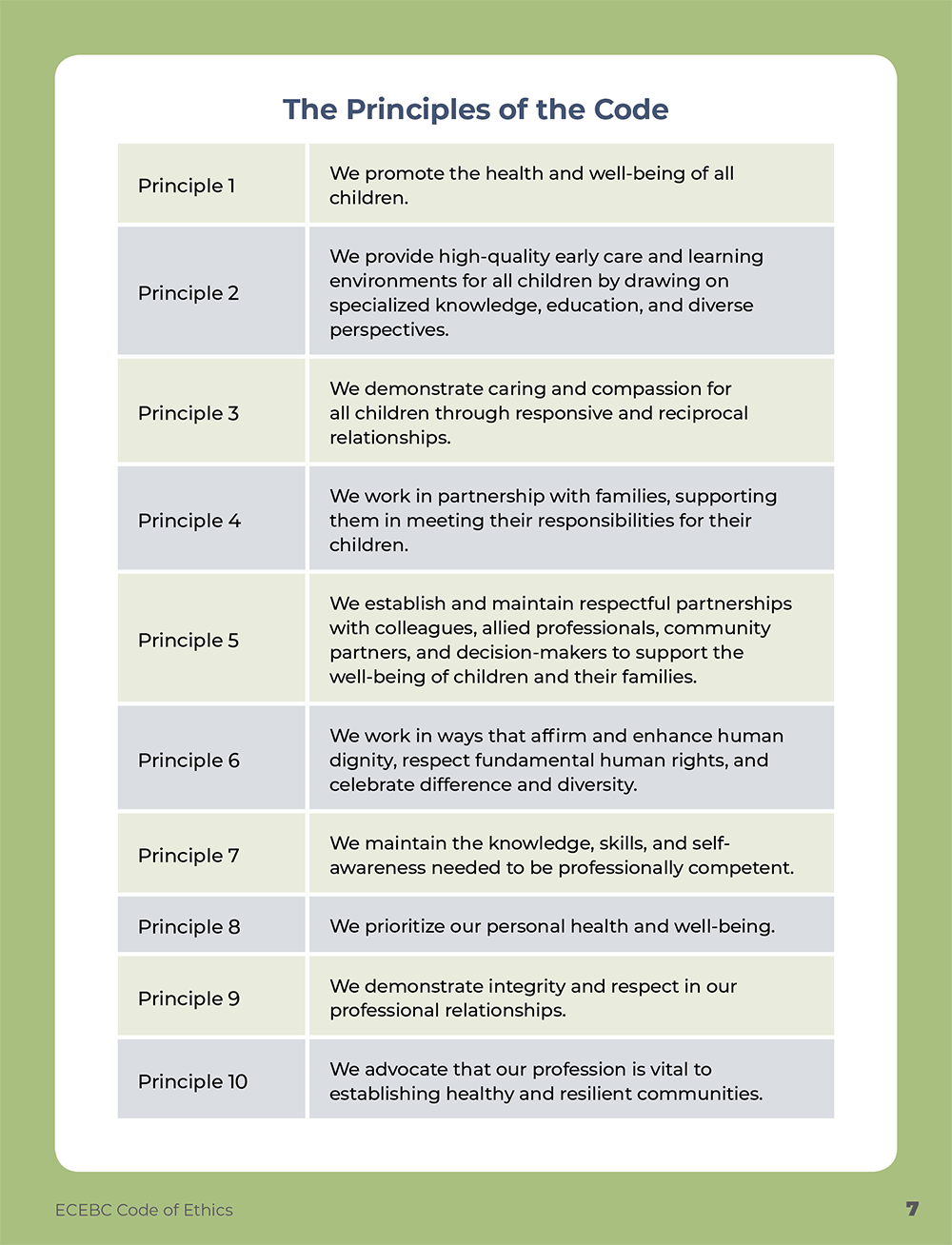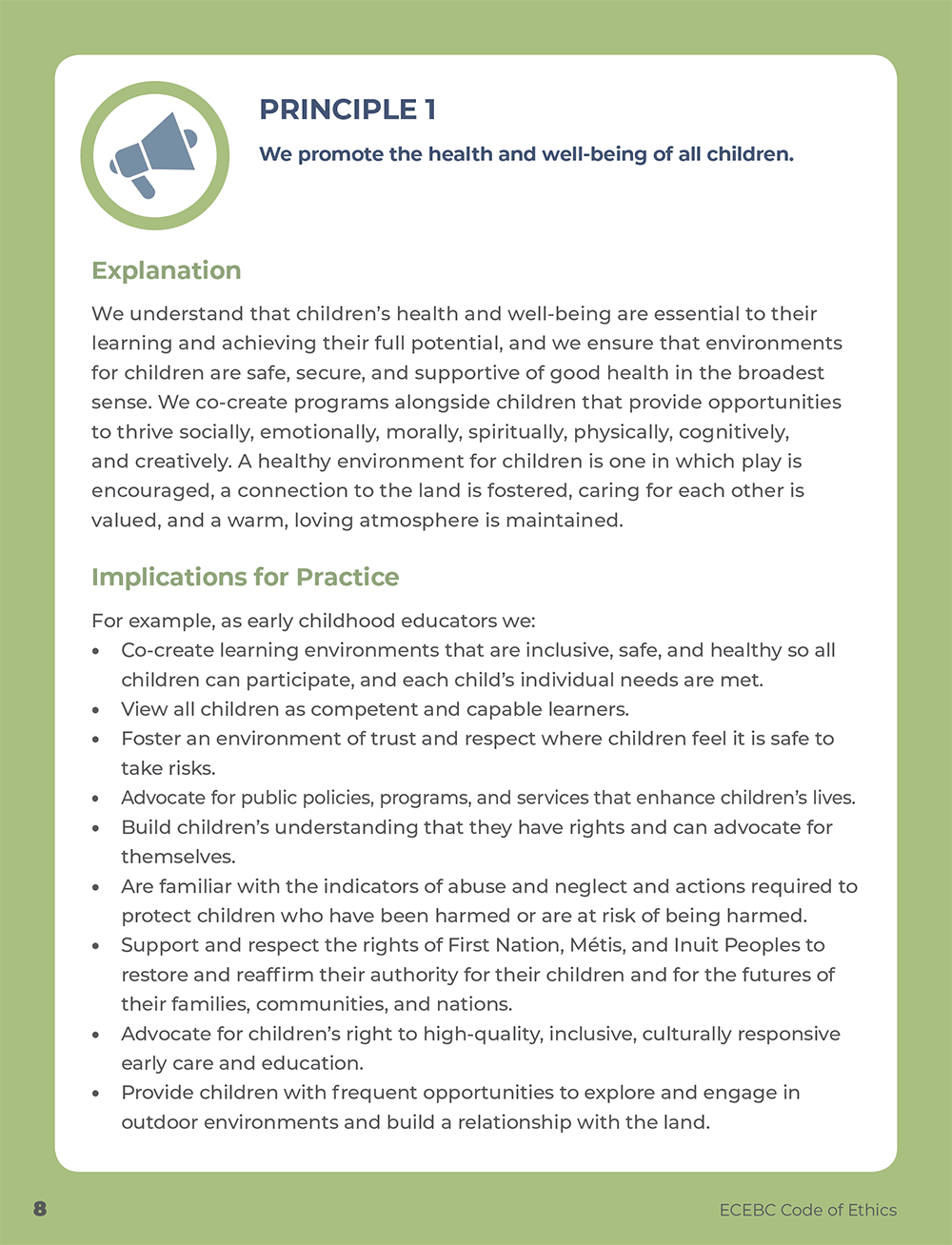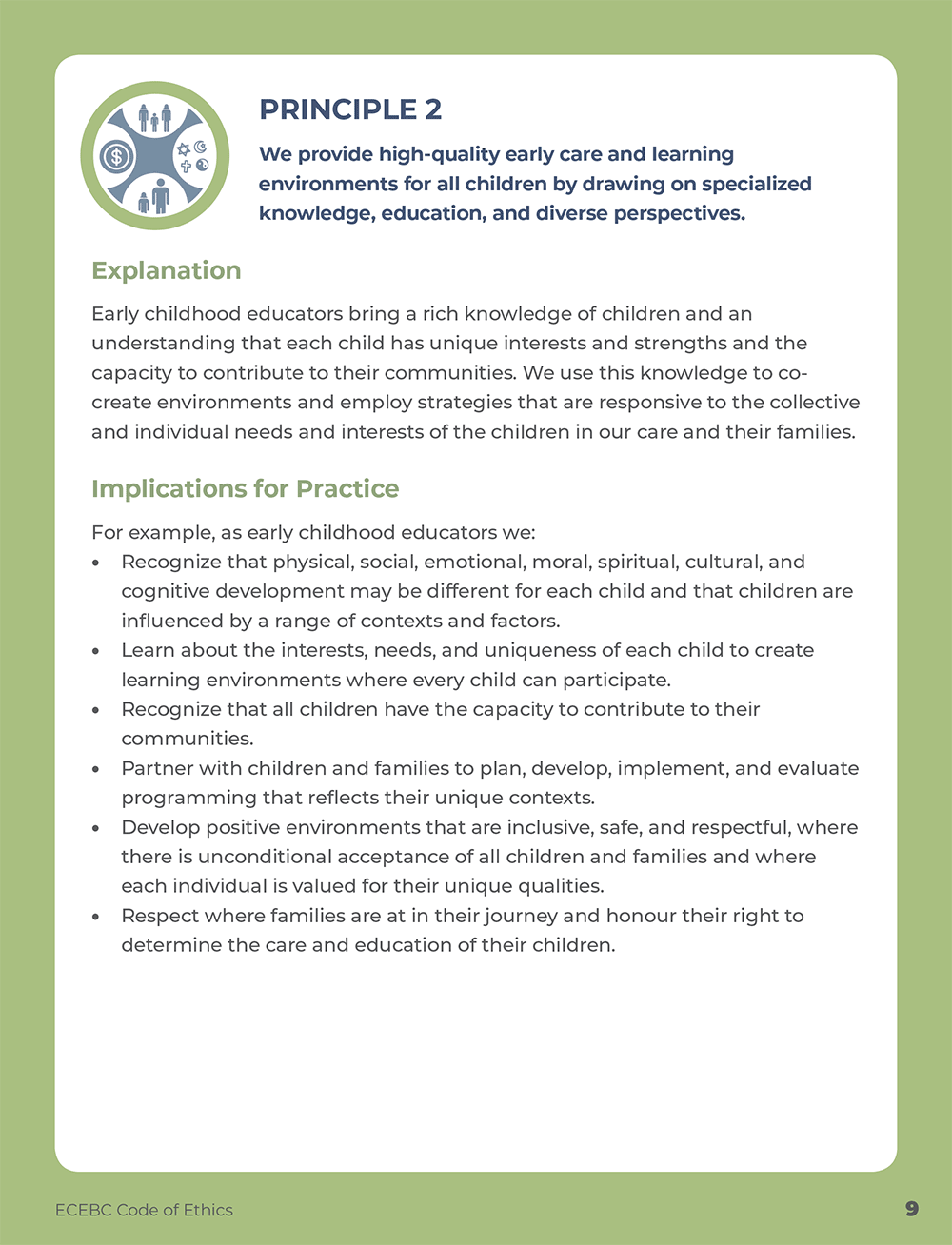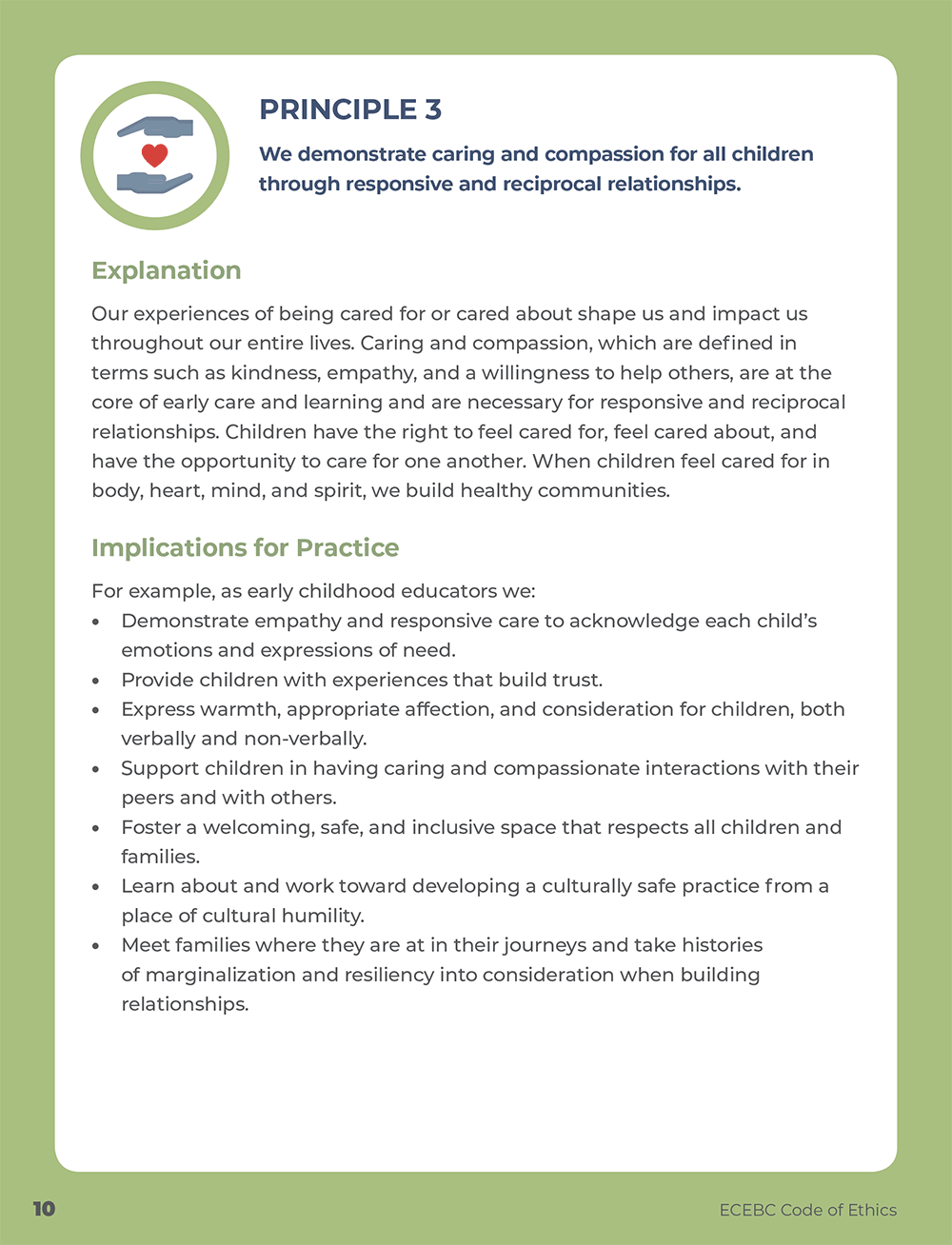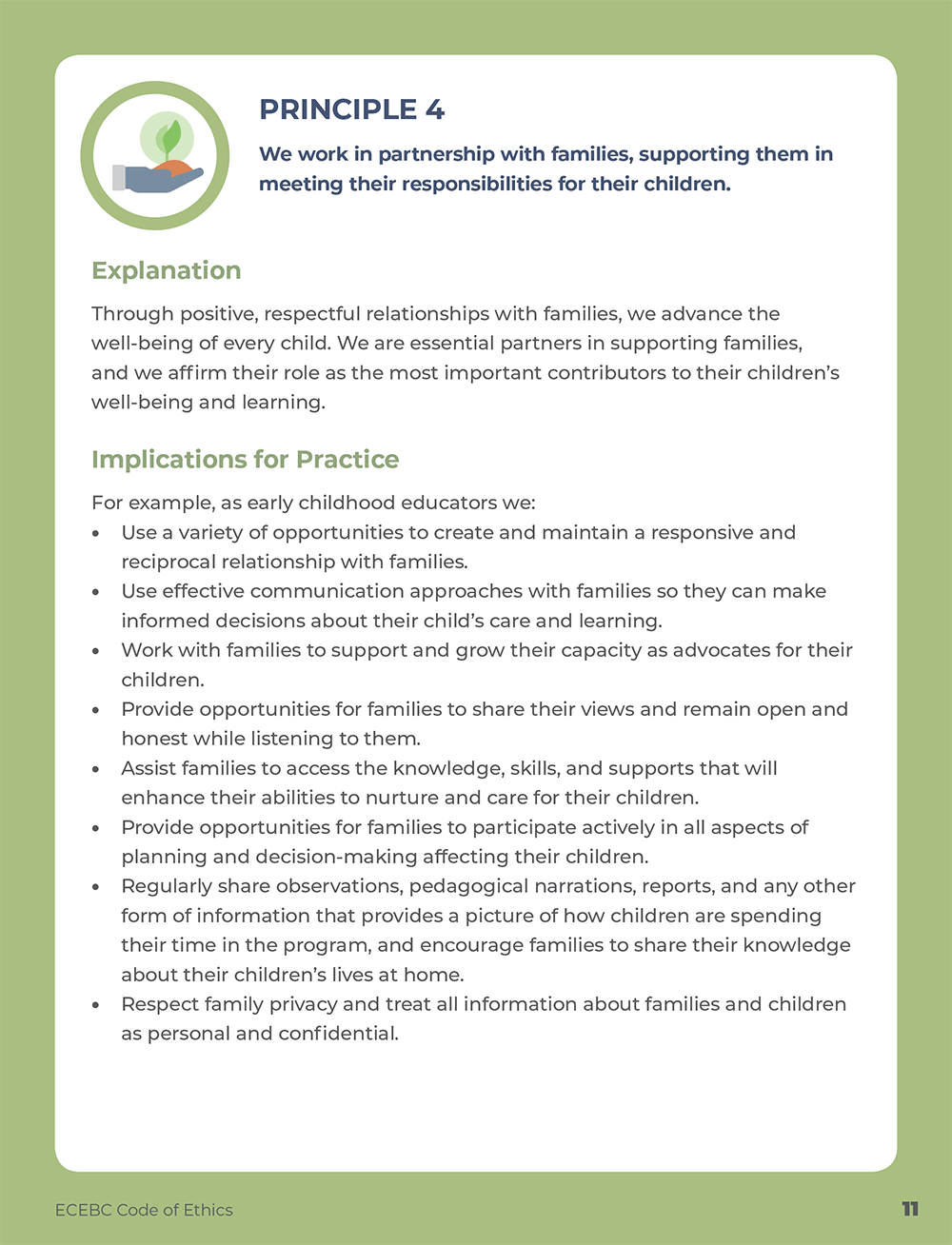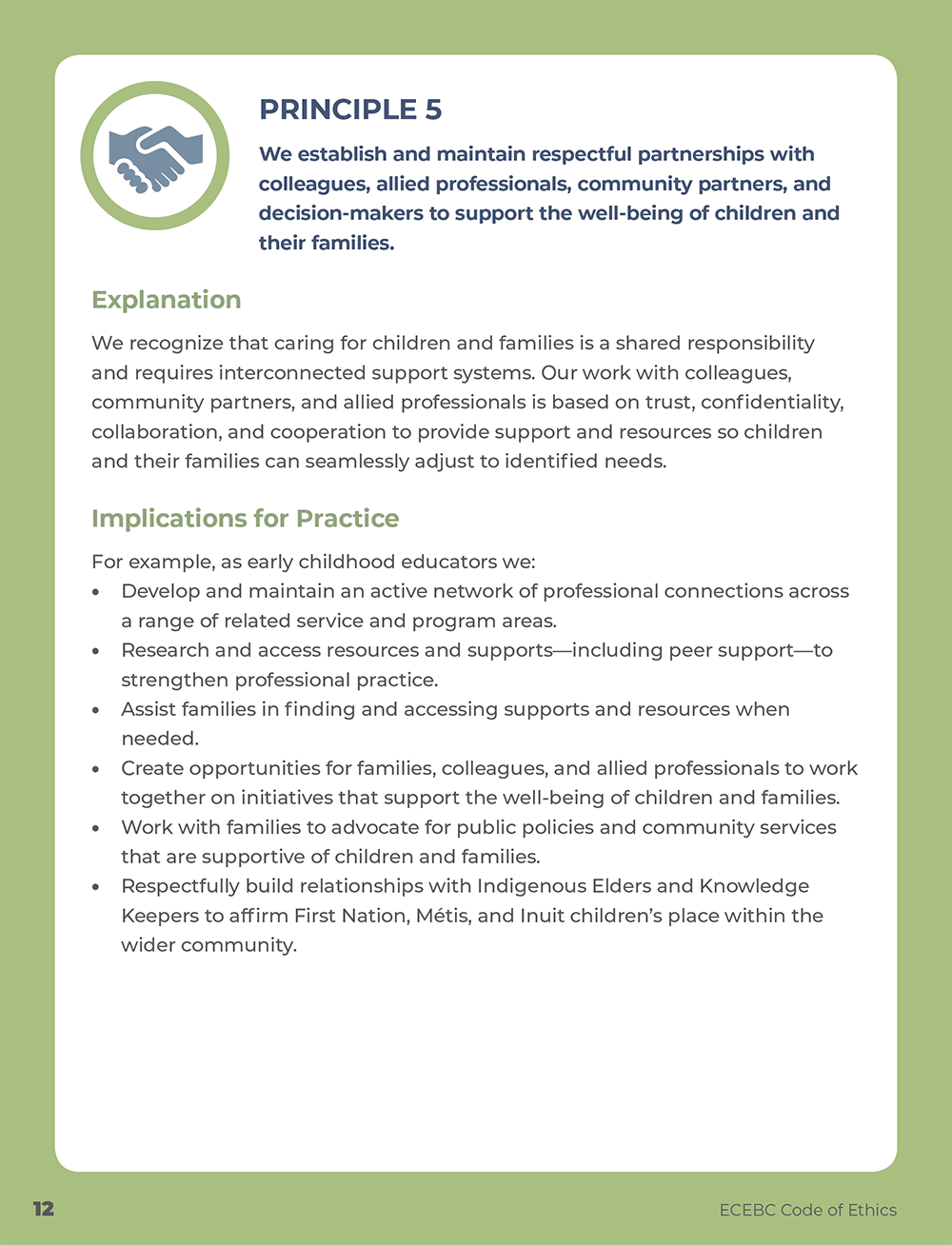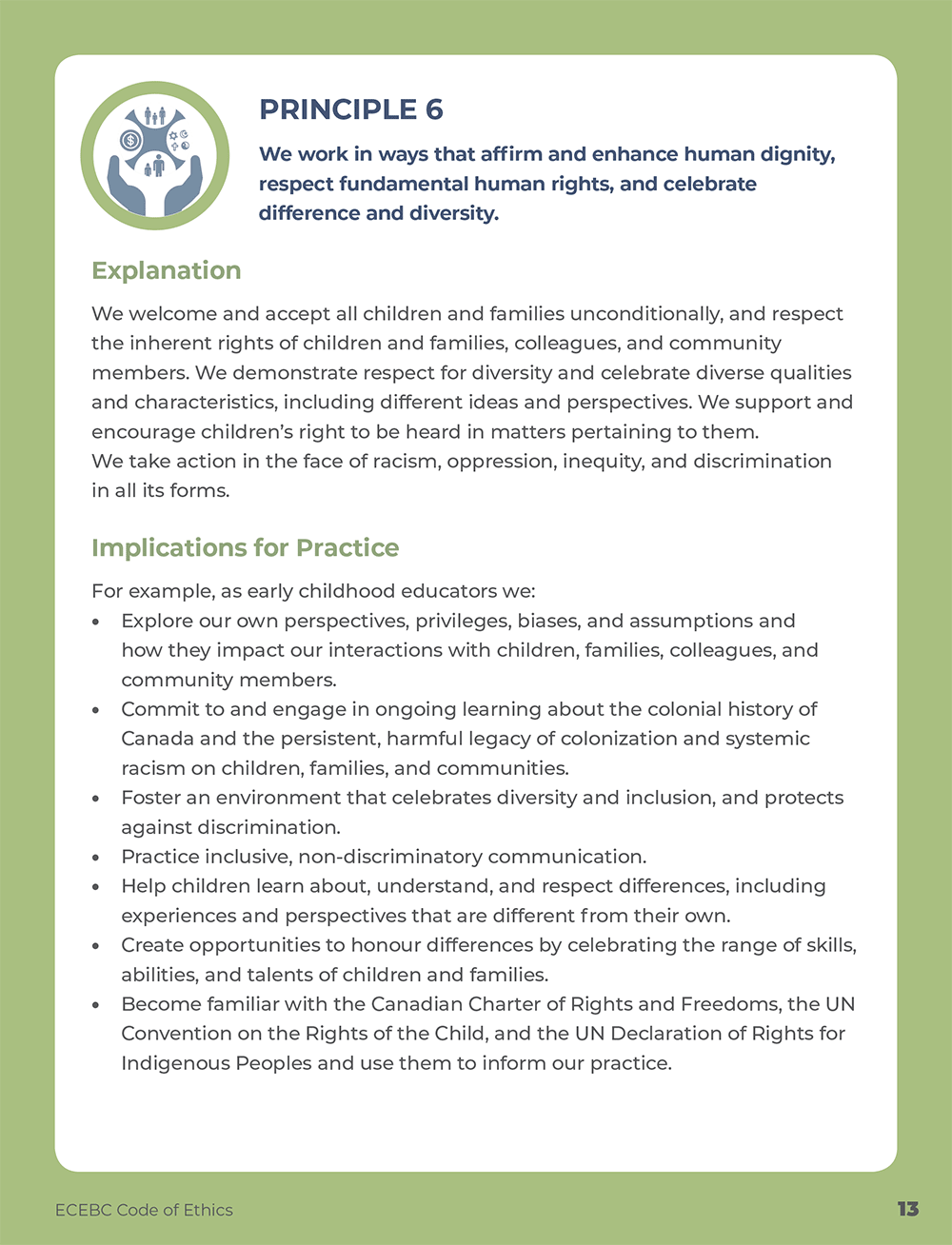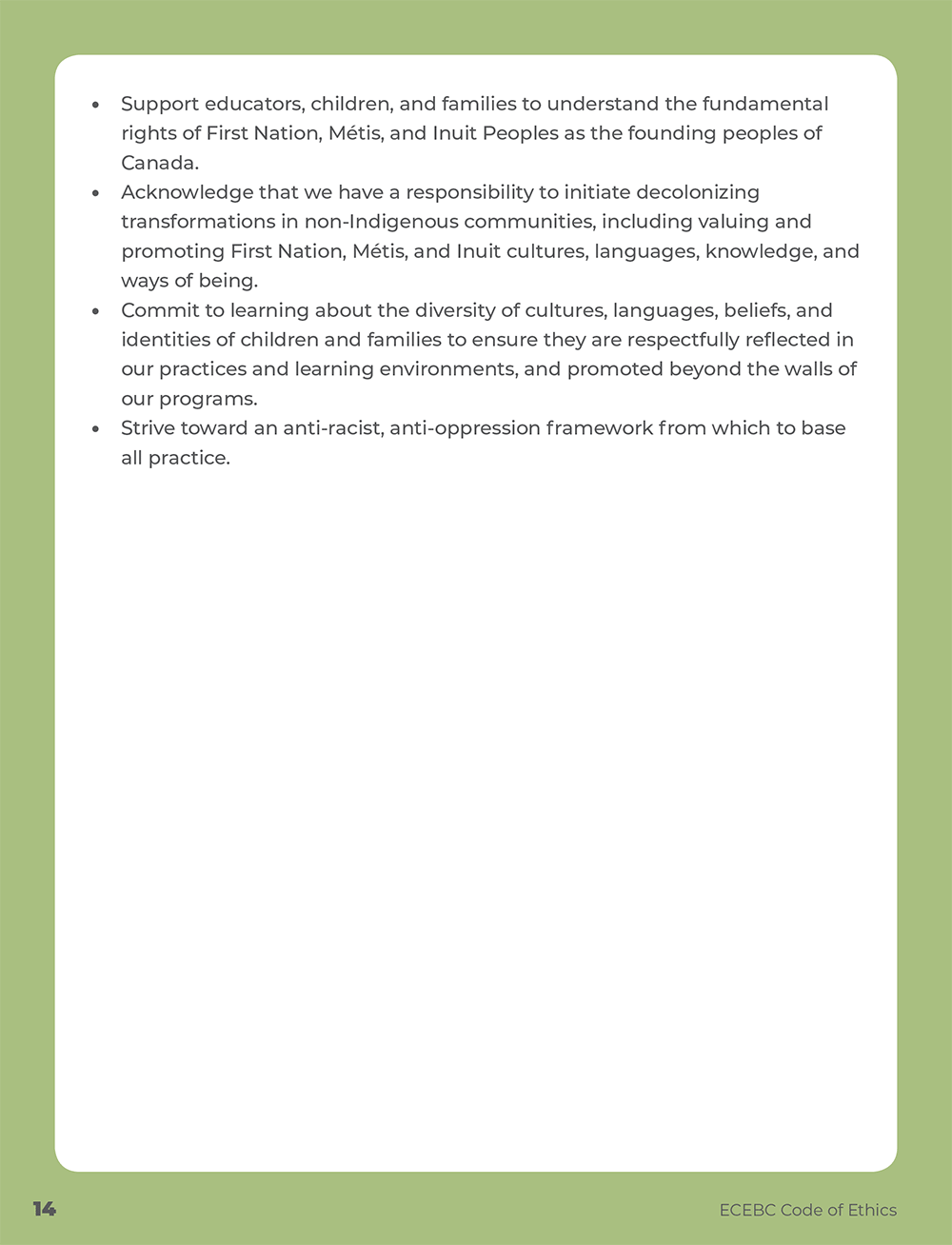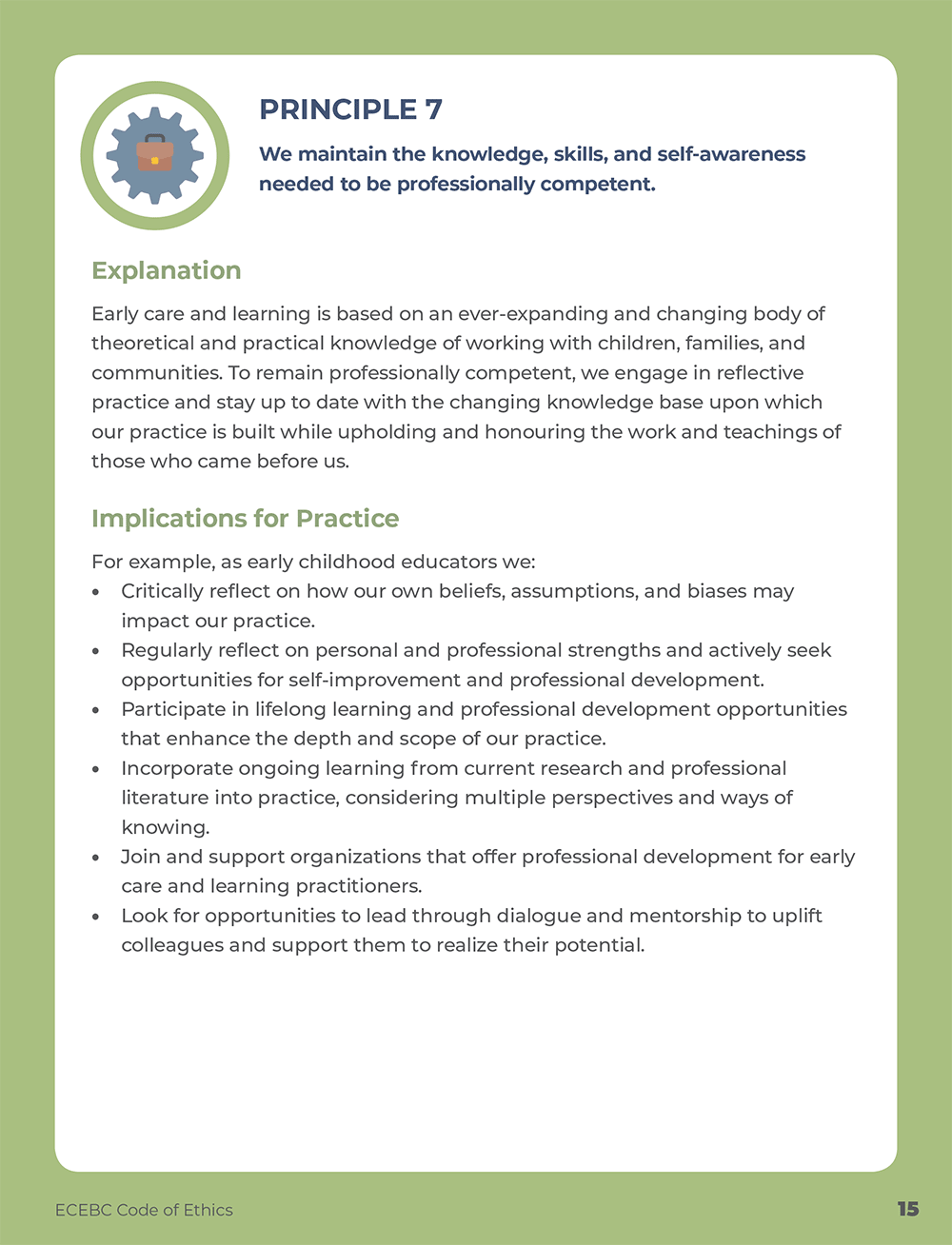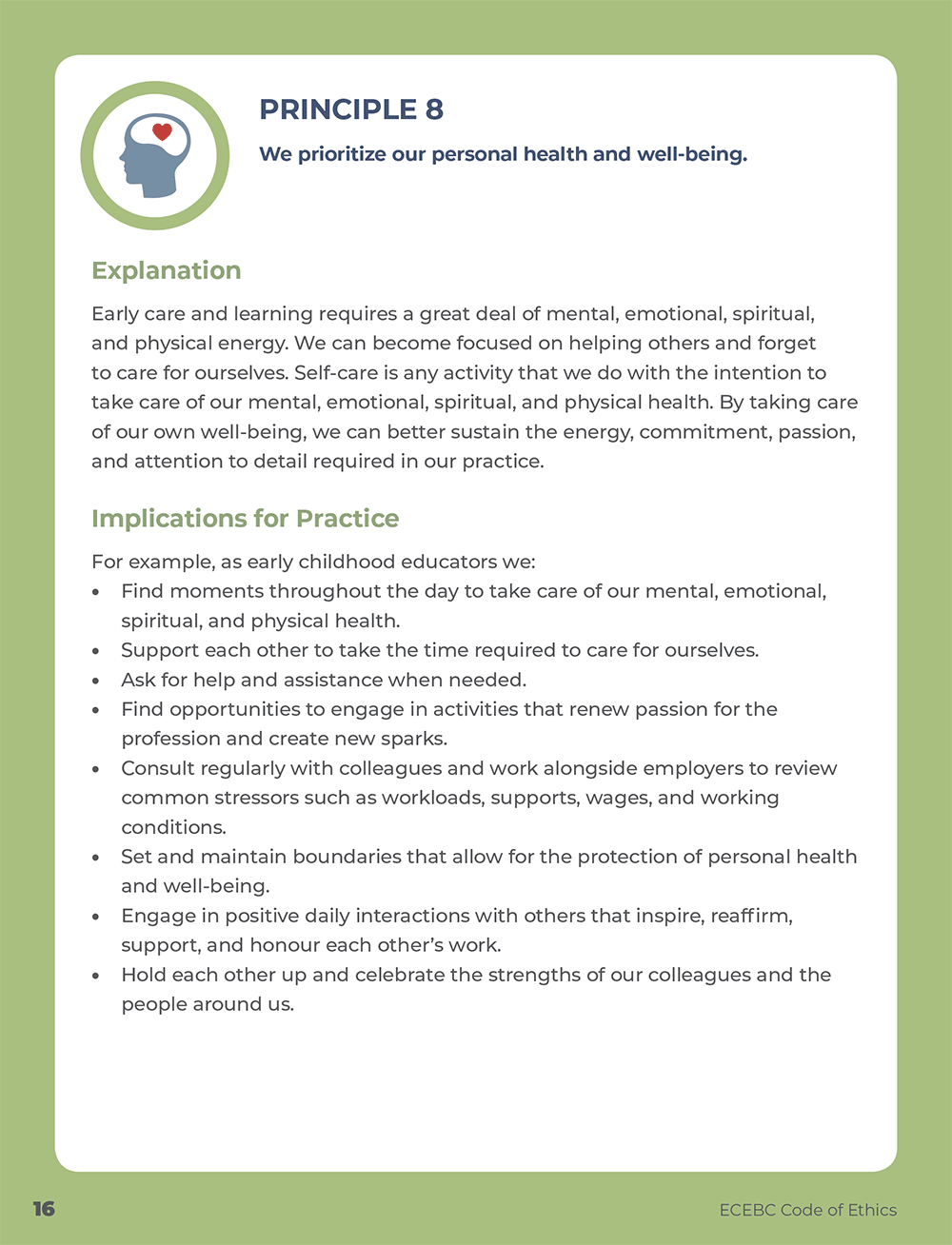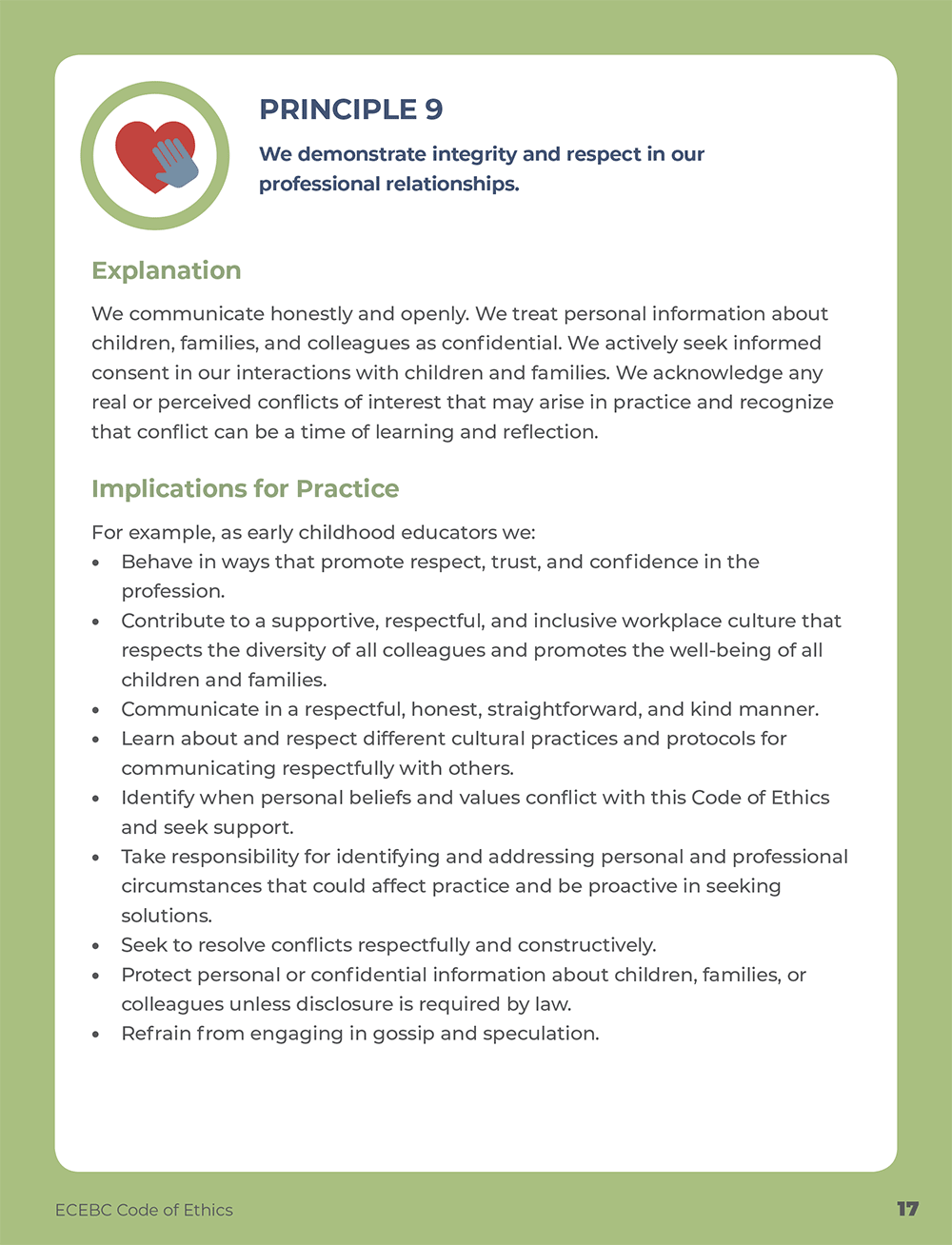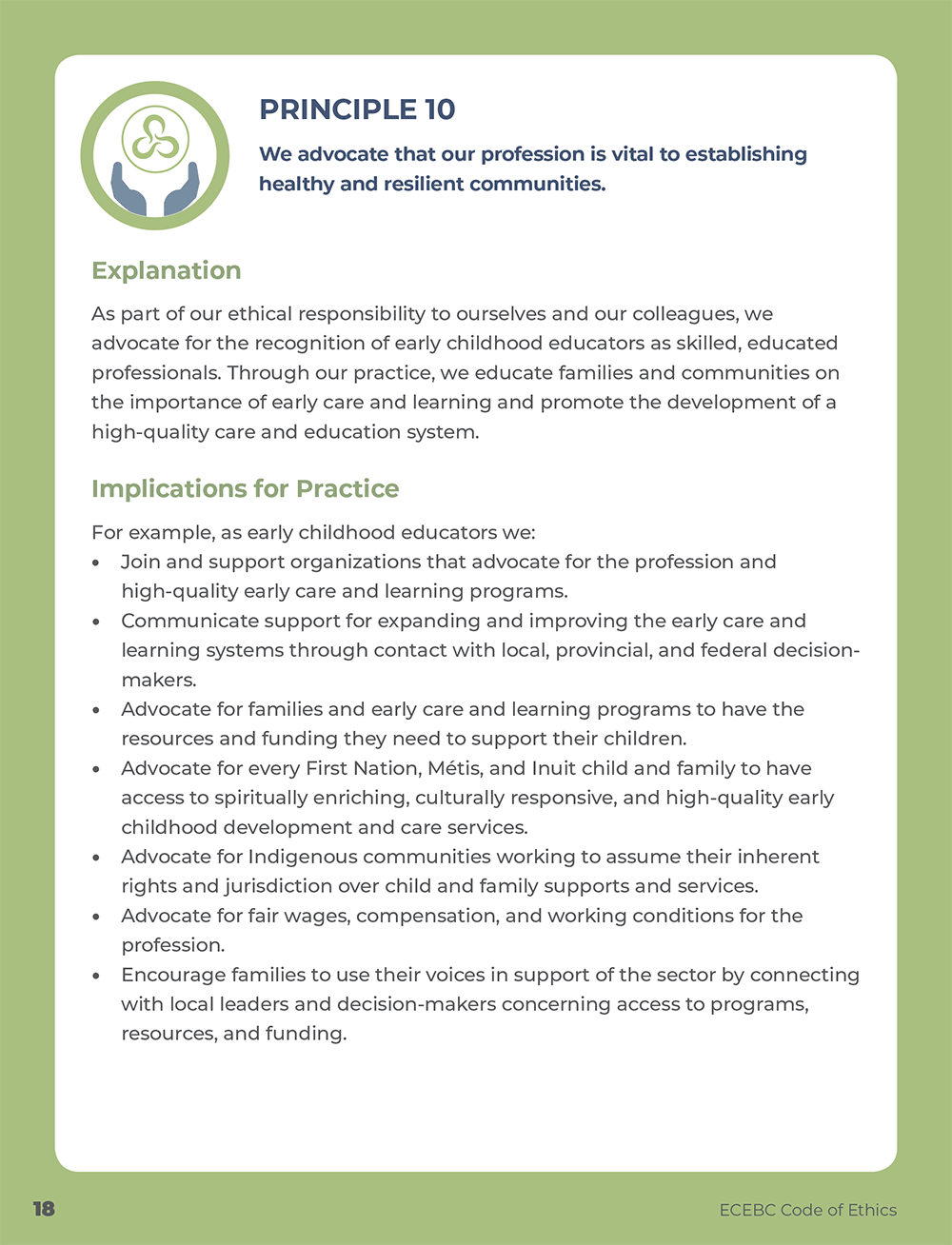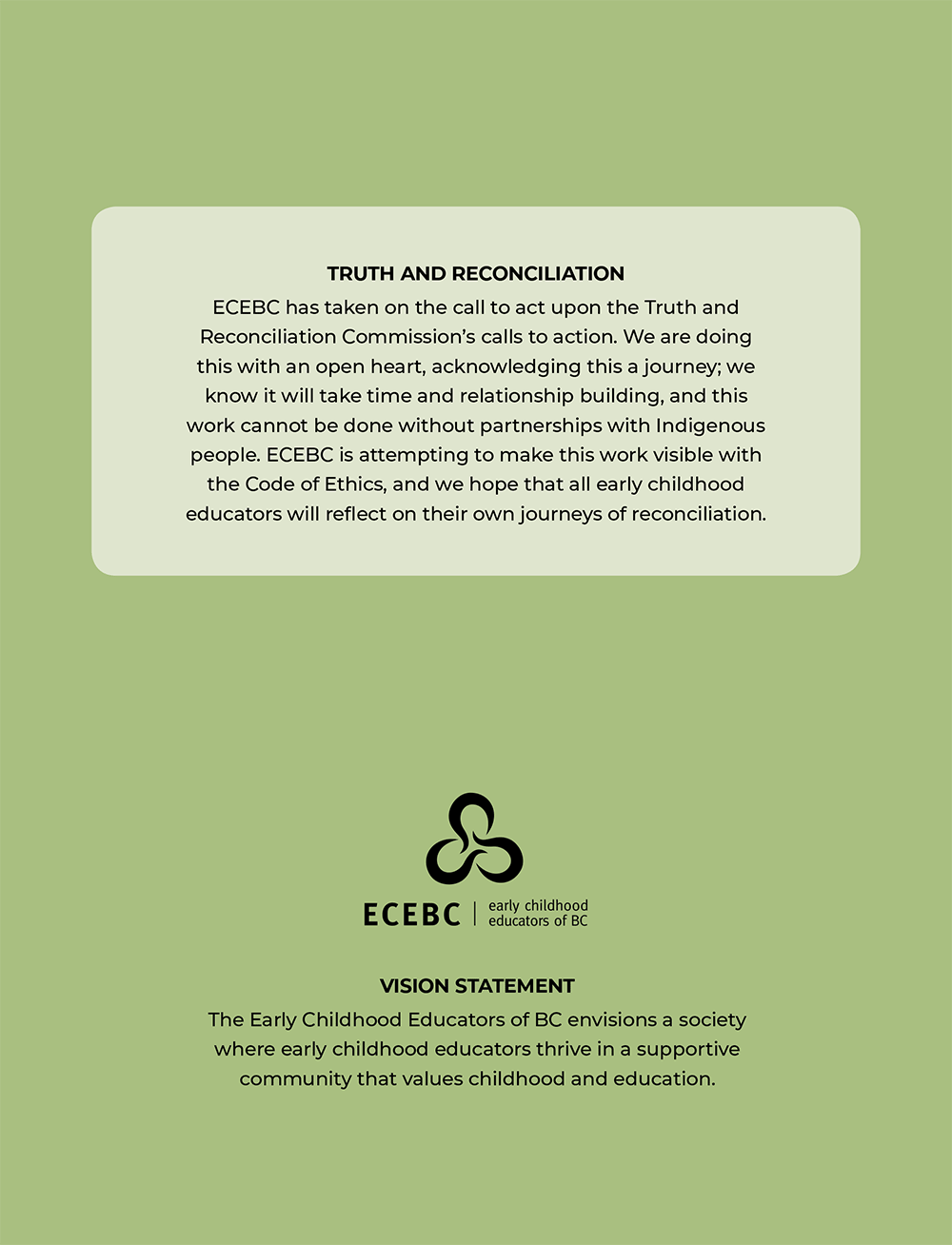ECEBC Code of Ethics
The Early Childhood Educators of BC (ECEBC) Code of Ethics represents the collective beliefs, values, and ethics that early childhood educators in British Columbia share. The 10 principles guide us in our daily professional practice with children, families, and colleagues. All rights reserved. No part of this book may be reproduced in any form by any means without written permission from the Early Childhood Educators of BC. To find out more about purchasing physical copies of the Code of Ethics please view our merchandise page.
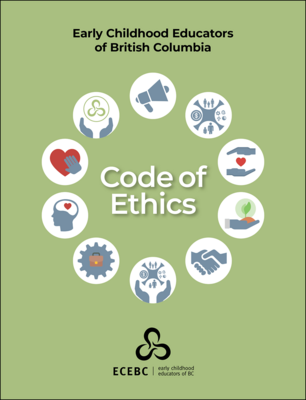
Acknowledgements
The revisions to the ECEBC Code of Ethics were possible thanks to funding from the Government of British Columbia, Ministry of Children and Family Development.
ECEBC would like to thank the national advisory committee that helped to start the revision process, and we thank Sandra Griffin and Frances Ricks for their work on the first draft of the Code of Ethics.
We are grateful to the BC Aboriginal Child Care Society for their partnership and valuable contributions to this Code of Ethics.
Lastly, we would like to thank the many early childhood educators from across the province who contributed to the revisions and volunteered their time to review and discuss the 10 principles of the Code of Ethics.
Copyright © 2021 Early Childhood Educators of British Columbia
309-515 West Pender Street, Vancouver BC V6B 1V5
www.ecebc.ca
Seventh edition, 2021
All rights reserved. No part of this book may be reproduced in any form by any means without written permission from the Early Childhood Educators of BC.
ISBN 978-0-968-2222-5-6 (print)
ISBN 978-0-968-2222-6-3 (PDF)
The ECEBC offices are located on the unceded, ancestral, and traditional territory of the xʷməθkʷəyəm̓ (Musqueam), selíl̓witulh ̓ (Tsleil-Waututh), sḵwxwú7mesh ̱ (Squamish) nations. We would like to acknowledge the unceded and traditional territories of the many nations across this province that host us and allow us to do our work in supporting children, families, educators, and communities. May each of us do our work together from this day forward and into the future with a good heart and an open mind.
The Early Childhood Educators of BC (ECEBC) Code of Ethics represents the collective beliefs, values, and ethics that early childhood educators in British Columbia share. The 10 principles guide us in our daily professional practice with children, families, and colleagues.
Ethical practice is essential to the quality of early care and learning programs in British Columbia. The trust families invest in early childhood educators when they leave their young children with us is hard won, and a professional Code of Ethics is how the profession says to families that their trust is well placed. It demonstrates that we share beliefs, values, and a moral philosophy. The Code frames positive expectations and provides aspirational goals. It is a living framework that improves with use and experience in practice.
While it is important to have a set of principles, it is another matter to take them to heart and live them. We may be challenged by others who think and act differently about what is acceptable for children and families. We may want to avoid confronting situations where this difference causes a sense of insecurity in addressing the issue at hand. Belonging to a professional body that shares a set of principles for ethical practice provides an extraordinary level of support for all early childhood educators and unites us in our practice. These principles reflect standards of conduct designed to prompt us to think and act in the best interests of the children and families we serve. Living these principles means not being silent about what needs to be addressed. Advocacy and taking action are grounded in the Code of Ethics.
The principles, explanations, and examples of practice in the Code of Ethics have been developed to assist us in our professional practice, both in daily planning and practice, as well as in finding solutions when there are conflicts among principles when we deal with problems or issues.
The collective beliefs in the Code of Ethics exist within the broad collective beliefs, values, and ethics of society. Specifically, the United Nations has a number of major human rights instruments signed by a majority of countries that describe global beliefs and values with respect to human rights.
The UN Convention on the Rights of the Child (UNCRC) is a key reference for the ECEBC Code of Ethics. The Code reflects the values of the UNCRC, and the UNCRC reflects the Universal Declaration of Human Rights, which is the single overarching global agreement on human rights.
The UNCRC has what are considered four core values:
- Non-discrimination (Article 2)
- Best interest of the child (Article 3)
- Right to life, survival, and development (Article 6)
- Right to a voice, viewpoints, and opinions (Articles 12 and 13)
This Code of Ethics reflects these core values as well as Article 18, which speaks to the rights of parents and children to benefit from government supports, including early care and learning programs.
The UN Declaration on the Rights of Indigenous Peoples (UNDRIP) is also a key reference for the ECEBC Code of Ethics. UNDRIP describes the rights of Indigenous Peoples from a global perspective, and equally applies to the rights of Indigenous Peoples in British Columbia. It specifically recognizes the inherent rights of Indigenous families and communities for the upbringing, education, and well-being of their children.
The Final Report of the Truth and Reconciliation Commission (TRC) of Canada has also been a key document in guiding the revisions to the Code of Ethics. The TRC’s Calls to Action address the ethical obligations that all levels of government and society must undertake to reconcile relations between Indigenous and non-Indigenous Peoples. Like UNDRIP, the TRC affirms the rights of Indigenous families and communities to educate and provide for ECEBC Code of Ethics 5 the well-being of their children. We call on non-Indigenous educators to live reconciliation through their daily practice and engage in intentional and thoughtful practice that embraces the Calls to Actions.
In getting to know the ECEBC Code of Ethics, the connections to these international human rights instruments will be apparent. Early childhood educators have a specific focus on supporting children to live in a spirit of peace, dignity, tolerance, freedom, equality, and solidarity and are committed to creating early care and learning environments that support and promote these values
The Code of Ethics articulates the principles and standards of practice endorsed by ECEBC. Members of ECEBC, as a condition of membership, agree to incorporate the Code principles into their practice. ECEBC advocates the acceptance of these principles and standards by all early childhood educators.
Structure
The Code of Ethics consists of 10 principles. Each principle is defined, and examples are provided to describe what the principle could look like in working with children, families, and colleagues. The definitions and descriptions are not definitive. Rather, they are a guide for early childhood educators to determine how the principles are reflected and evident in our practice.
Derivation
ECEBC received funding to develop the original Code of Ethics in 1995. The researchers, Griffin and Ricks, reviewed and analyzed key values in codes of ethics of early childhood education organizations across Canada and the US. Using a values clarification process with ECEBC and Canadian Child Care Federation members, they identified principles that were consistent with the ethos of early childhood practice. In 2020, the principles were revised in consultation with national and provincial advisory committees to better reflect the current realities of the 21st century
All 10 principles are reflected in the ethical practice of early childhood educators. No one principle is more or less important than another. We work together to support ethical practice. However, there will be circumstances in which the ethical principles conflict, and we will face the dilemma of having to choose between them. In these situations, we have to carefully think through the consequences of giving each of the conflicting principles primacy. By evaluating the consequences, we can then choose which principle or principles ought to be given more weight. Anticipating there will be moments when time is of the essence and a quick decision is necessary, consistent use of the Code in individual and team practice better prepares us to respond quickly when required.
Resolving ethical dilemmas can be difficult. It is important to consult with colleagues and obtain different perspectives on the problem or issue. If this consultation does not clarify the best course of action, contact the ECEBC office for guidance and connection to a broader network of resources. By working together, we can ensure our collective commitment to ethical practice
| Principle 1 | We promote the health and well‑being of all children. |
| Principle 2 | We provide high-quality early care and learning environments for all children by drawing on specialized knowledge, education, and diverse perspectives. |
| Principle 3 | We demonstrate caring and compassion for all children through responsive and reciprocal relationships. |
| Principle 4 | We work in partnership with families, supporting them in meeting their responsibilities for their children. |
| Principle 5 | We establish and maintain respectful partnerships with colleagues, allied professionals, community partners, and decision-makers to support the well‑being of children and their families. |
| Principle 6 | We work in ways that affirm and enhance human dignity, respect fundamental human rights, and celebrate difference and diversity. |
| Principle 7 | We maintain the knowledge, skills, and selfawareness needed to be professionally competent. |
| Principle 8 | We prioritize our personal health and well‑being. |
| Principle 9 | We demonstrate integrity and respect in our professional relationships. |
| Principle 10 | We advocate that our profession is vital to establishing healthy and resilient communities. |

We promote the health and well being of all children
Explanation
We understand that children’s health and well-being are essential to their learning and achieving their full potential, and we ensure that environments for children are safe, secure, and supportive of good health in the broadest sense. We co-create programs alongside children that provide opportunities to thrive socially, emotionally, morally, spiritually, physically, cognitively, and creatively. A healthy environment for children is one in which play is encouraged, a connection to the land is fostered, caring for each other is valued, and a warm, loving atmosphere is maintained.
Implications for Practice
For example, as early childhood educators we:
- Co-create learning environments that are inclusive, safe, and healthy so all children can participate, and each child’s individual needs are met.
- View all children as competent and capable learners.
- Foster an environment of trust and respect where children feel it is safe to take risks.
- Advocate for public policies, programs, and services that enhance children's lives.
- Build children's understanding that they have rights and can advocate for themselves.
- Are familiar with the indicators of abuse and neglect and actions required to protect children who have been harmed or are at risk of being harmed.
- Support and respect the rights of First Nation, Métis, and Inuit Peoples to restore and reaffirm their authority for their children and for the futures of their families, communities, and nations.
- Advocate for children's right to high-quality, inclusive, culturally responsive early care and education.
- Provide children with frequent opportunities to explore and engage in outdoor environments and build a relationship with the land

We provide high-quality early care and learning environments for all children by drawing on specialized knowledge, education, and diverse perspectives.
Explanation
Early childhood educators bring a rich knowledge of children and an understanding that each child has unique interests and strengths and the
capacity to contribute to their communities. We use this knowledge to co-create environments and employ strategies that are responsive to the collective and individual needs and interests of the children in our care and their families.
Implications for Practice
For example, as early childhood educators we:
- Recognize that physical, social, emotional, moral, spiritual, cultural, and cognitive development may be different for each child and that children are influenced by a range of contexts and factors.
- Learn about the interests, needs, and uniqueness of each child to create learning environments where every child can participate.
- Recognize that all children have the capacity to contribute to their communities.
- Partner with children and families to plan, develop, implement, and evaluate programming that reflects their unique contexts.
- Develop positive environments that are inclusive, safe, and respectful, where there is unconditional acceptance of all children and families and where each individual is valued for their unique qualities.
- Respect where families are at in their journey and honour their right to determine the care and education of their children.
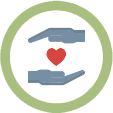
We demonstrate caring and compassion for all children through responsive and reciprocal relationships.
Explanation
Our experiences of being cared for or cared about shape us and impact us throughout our entire lives. Caring and compassion, which are defined in terms such as kindness, empathy, and a willingness to help others, are at the core of early care and learning and are necessary for responsive and reciprocal relationships. Children have the right to feel cared for, feel cared about, and have the opportunity to care for one another. When children feel cared for in body, heart, mind, and spirit, we build healthy communities.
Implications for Practice
For example, as early childhood educators we:
- Demonstrate empathy and responsive care to acknowledge each child’s emotions and expressions of need.
- Provide children with experiences that build trust.
- Express warmth, appropriate affection, and consideration for children, both verbally and non-verbally.
- Support children in having caring and compassionate interactions with their peers and with others.
- Foster a welcoming, safe, and inclusive space that respects all children and families.
- Learn about and work toward developing a culturally safe practice from a place of cultural humility.
- Meet families where they are at in their journeys and take histories of marginalization and resiliency into consideration when building relationships.

We work in partnership with families, supporting them in meeting their responsibilities for their children.
Explanation
Through positive, respectful relationships with families, we advance the well‑being of every child. We are essential partners in supporting families, and we affirm their role as the most important contributors to their children’s well‑being and learning.
Implications for Practice
For example, as early childhood educators we:
- Use a variety of opportunities to create and maintain a responsive and reciprocal relationship with families.
- Use effective communication approaches with families so they can make informed decisions about their child’s care and learning.
- Work with families to support and grow their capacity as advocates for their children.
- Provide opportunities for families to share their views and remain open and honest while listening to them.
- Assist families to access the knowledge, skills, and supports that will enhance their abilities to nurture and care for their children.
- Provide opportunities for families to participate actively in all aspects of planning and decision-making affecting their children.
- Regularly share observations, pedagogical narrations, reports, and any other form of information that provides a picture of how children are spending their time in the program, and encourage families to share their knowledge about their children’s lives at home.
- Respect family privacy and treat all information about families and children as personal and confidential.

We establish and maintain respectful partnerships with colleagues, allied professionals, community partners, and decision-makers to support the well‑being of children and their families.
Explanation
We recognize that caring for children and families is a shared responsibility and requires interconnected support systems. Our work with colleagues, community partners, and allied professionals is based on trust, confidentiality, collaboration, and cooperation to provide support and resources so children and their families can seamlessly adjust to identified needs.
Implications for Practice
For example, as early childhood educators we:
- Develop and maintain an active network of professional connections across a range of related service and program areas.
- Research and access resources and supports—including peer support—to strengthen professional practice.
- Assist families in finding and accessing supports and resources when needed.
- Create opportunities for families, colleagues, and allied professionals to work together on initiatives that support the well‑being of children and families.
- Work with families to advocate for public policies and community services that are supportive of children and families.
- Respectfully build relationships with Indigenous Elders and Knowledge Keepers to affirm First Nation, Métis, and Inuit children’s place within the wider community.

We work in ways that affirm and enhance human dignity, respect fundamental human rights, and celebrate difference and diversity.
Explanation
We welcome and accept all children and families unconditionally, and respect the inherent rights of children and families, colleagues, and community members. We demonstrate respect for diversity and celebrate diverse qualities and characteristics, including different ideas and perspectives. We support and encourage children’s right to be heard in matters pertaining to them. We take action in the face of racism, oppression, inequity, and discrimination in all its forms.
Implications for Practice
For example, as early childhood educators we:
- Explore our own perspectives, privileges, biases, and assumptions and how they impact our interactions with children, families, colleagues, and community members.
- Commit to and engage in ongoing learning about the colonial history of Canada and the persistent, harmful legacy of colonization and systemic racism on children, families, and communities.
- Foster an environment that celebrates diversity and inclusion, and protects against discrimination.
- Practice inclusive, non-discriminatory communication.
- Help children learn about, understand, and respect differences, including experiences and perspectives that are different from their own.
- Create opportunities to honour differences by celebrating the range of skills, abilities, and talents of children and families.
- Become familiar with the Canadian Charter of Rights and Freedoms, the UN Convention on the Rights of the Child, and the UN Declaration of Rights for Indigenous Peoples and use them to inform our practice.
- Support educators, children, and families to understand the fundamental rights of First Nation, Métis, and Inuit Peoples as the founding peoples of Canada.
- Acknowledge that we have a responsibility to initiate decolonizing transformations in non-Indigenous communities, including valuing and promoting First Nation, Métis, and Inuit cultures, languages, knowledge, and ways of being.
- Commit to learning about the diversity of cultures, languages, beliefs, and identities of children and families to ensure they are respectfully reflected in our practices and learning environments, and promoted beyond the walls of our programs.
- Strive toward an anti-racist, anti-oppression framework from which to base all practice.

We maintain the knowledge, skills, and self-awareness needed to be professionally competent.
Explanation
Early care and learning is based on an ever-expanding and changing body of theoretical and practical knowledge of working with children, families, and communities. To remain professionally competent, we engage in reflective practice and stay up to date with the changing knowledge base upon which our practice is built while upholding and honouring the work and teachings of those who came before us.
Implications for Practice
For example, as early childhood educators we:
- Critically reflect on how our own beliefs, assumptions, and biases may impact our practice.
- Regularly reflect on personal and professional strengths and actively seek opportunities for self-improvement and professional development.
- Participate in lifelong learning and professional development opportunities that enhance the depth and scope of our practice.
- Incorporate ongoing learning from current research and professional literature into practice, considering multiple perspectives and ways of knowing.
- Join and support organizations that offer professional development for early care and learning practitioners.
- Look for opportunities to lead through dialogue and mentorship to uplift colleagues and support them to realize their potential.

We prioritize our personal health and well‑being.
Explanation
Early care and learning requires a great deal of mental, emotional, spiritual, and physical energy. We can become focused on helping others and forget to care for ourselves. Self-care is any activity that we do with the intention to take care of our mental, emotional, spiritual, and physical health. By taking care of our own well‑being, we can better sustain the energy, commitment, passion, and attention to detail required in our practice.
Implications for Practice
For example, as early childhood educators we:
- Find moments throughout the day to take care of our mental, emotional, spiritual, and physical health.
- Support each other to take the time required to care for ourselves.
- Ask for help and assistance when needed.
- Find opportunities to engage in activities that renew passion for the profession and create new sparks.
- Consult regularly with colleagues and work alongside employers to review common stressors such as workloads, supports, wages, and working conditions.
- Set and maintain boundaries that allow for the protection of personal health and well‑being.
- Engage in positive daily interactions with others that inspire, reaffirm, support, and honour each other’s work.
- Hold each other up and celebrate the strengths of our colleagues and the people around us.

We demonstrate integrity and respect in our professional relationships.
Explanation
We communicate honestly and openly. We treat personal information about children, families, and colleagues as confidential. We actively seek informed consent in our interactions with children and families. We acknowledge any real or perceived conflicts of interest that may arise in practice and recognize that conflict can be a time of learning and reflection.
Implications for Practice
For example, as early childhood educators we:
- Behave in ways that promote respect, trust, and confidence in the profession.
- Contribute to a supportive, respectful, and inclusive workplace culture that respects the diversity of all colleagues and promotes the well‑being of all children and families.
- Communicate in a respectful, honest, straightforward, and kind manner.
- Learn about and respect different cultural practices and protocols for communicating respectfully with others.
- Identify when personal beliefs and values conflict with this Code of Ethics and seek support.
- Take responsibility for identifying and addressing personal and professional circumstances that could affect practice and be proactive in seeking solutions.
- Seek to resolve conflicts respectfully and constructively.
- Protect personal or confidential information about children, families, or colleagues unless disclosure is required by law.
- Refrain from engaging in gossip and speculation.
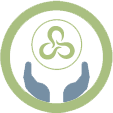
We advocate that our profession is vital to establishing healthy and resilient communities.
Explanation
As part of our ethical responsibility to ourselves and our colleagues, we advocate for the recognition of early childhood educators as skilled, educated professionals. Through our practice, we educate families and communities on the importance of early care and learning and promote the development of a high-quality care and education system.
Implications for Practice
For example, as early childhood educators we:
- Join and support organizations that advocate for the profession and high-quality early care and learning programs.
- Communicate support for expanding and improving the early care and learning systems through contact with local, provincial, and federal decision-makers.
- Advocate for families and early care and learning programs to have the resources and funding they need to support their children.
- Advocate for every First Nation, Métis, and Inuit child and family to have access to spiritually enriching, culturally responsive, and high-quality early childhood development and care services.
- Advocate for Indigenous communities working to assume their inherent rights and jurisdiction over child and family supports and services.
- Advocate for fair wages, compensation, and working conditions for the profession.
- Encourage families to use their voices in support of the sector by connecting with local leaders and decision-makers concerning access to programs, resources, and funding.
TRUTH AND RECONCILIATION
ECEBC has taken on the call to act upon the Truth and Reconciliation Commission’s calls to action. We are doing this with an open heart, acknowledging this a journey; we know it will take time and relationship building, and this work cannot be done without partnerships with Indigenous people. ECEBC is attempting to make this work visible with the Code of Ethics, and we hope that all early childhood educators will reflect on their own journeys of reconciliation.
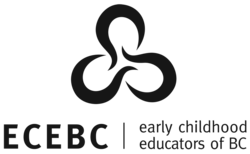
VISION STATEMENT
The Early Childhood Educators of BC envisions a society where early childhood educators thrive in a supportive community that values childhood and education.
